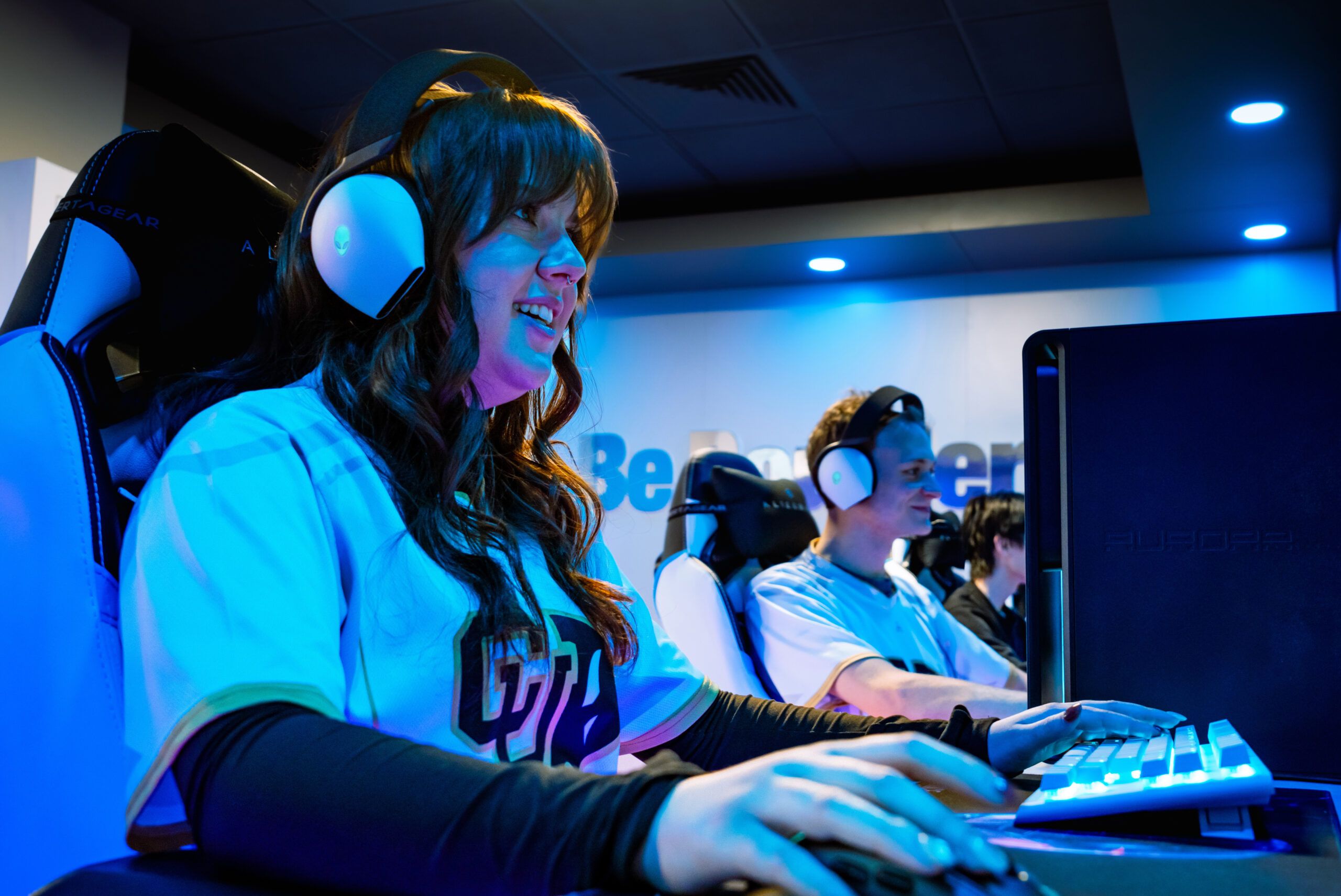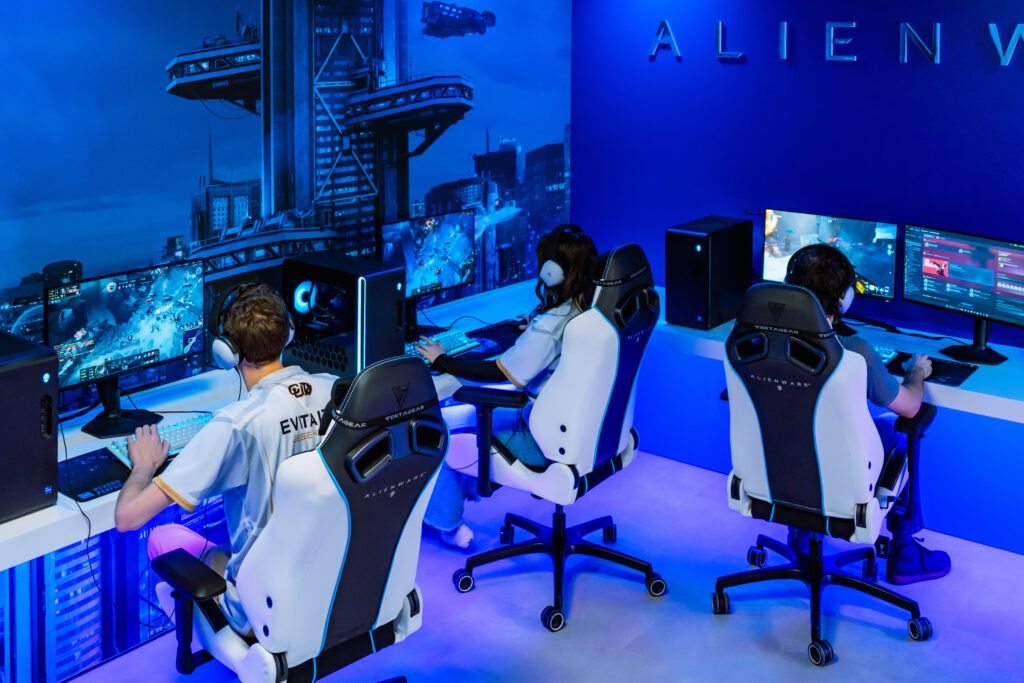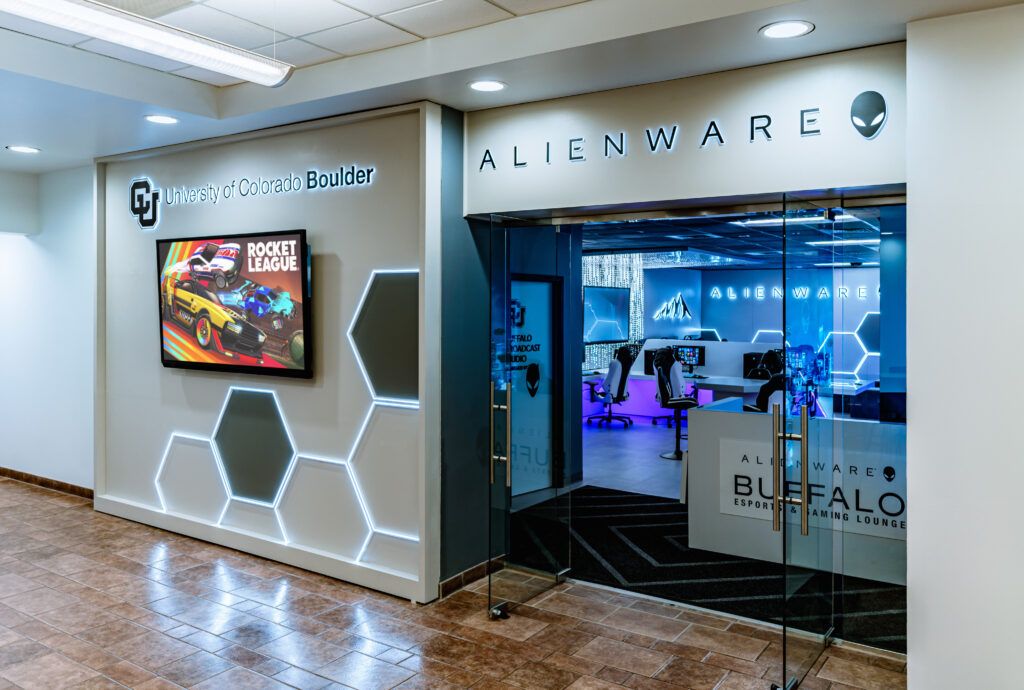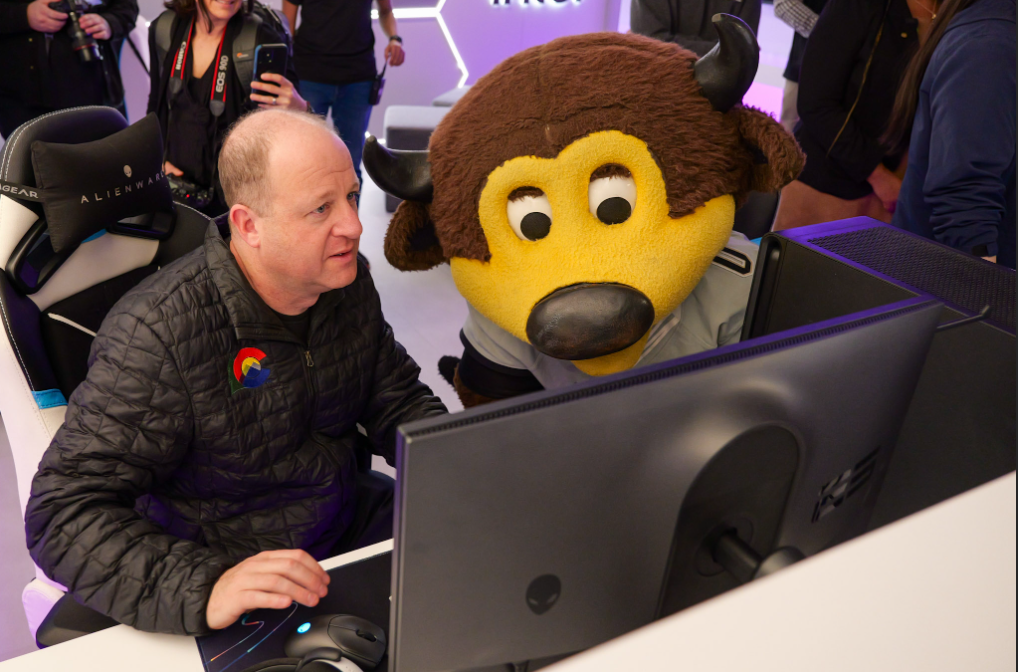CU esports center highlights evolution of video games in education
From “that’ll rot your brain” to key component of campus experience

BOULDER — For the first few decades of their existence, video games weren’t typically treated with much respect from those in the educational arena.
During my school days, most of which occurred during the previous millennium (gasp!), teachers and administrators warned that spending too much time with Mario and Luigi would rot a young person’s brain. But attitudes evolve, and video games are increasingly recognized as an integral part of students’ social and educational development.
This conceptual shift is front and center at the University of Colorado, which is now the home to newly opened Alienware Buffalo Esports and Gaming Lounge, a formerly underused corner of the University Memorial Center that — thanks to support from gaming and computer giants Alienware and Dell Inc. — has been transformed into an unofficial clubhouse for the campus’ gaming and esports community.
SPONSORED CONTENT
22nd Annual Vintage Affair: A Community Gathering to Support Pathways
The 22nd Annual A Vintage Affair event, presented by Wilbur’s Total Beverage, benefits Pathways’ mission of providing expert medical and comfort care for individuals navigating the last months of life.
“With the evolution of gaming, there’s a lot more collaboration, a lot more teamwork. This is about skills-development for our undergraduates,” CU spokesperson Stacy Wagner told BizWest.”… The university is responsible for student success, but there’s classroom student success and then there’s also the educational experience, which is everything that happens outside of the classroom.”
When older folks, or people less familiar with the rise of esports, think about video games, “they often think about a very siloed experience. It’s someone in their dorm, just sort of existing,” CU coordinator for gaming programs Adam Pallas said. But the reality is often much more social and collaborative.
“Having a space like this really communicates to the broader public that video games matter, video games are on the rise, video games don’t rot the brain,” said Arturo Cortez, an assistant professor of learning sciences and human development who studies how video games can be leveraged for learning.
CU’s University Memorial Center, the school’s student union building, “is the living room of the campus,” Pallas said. And what good is a living room to a college student without a place to game with friends?
It’s particularly important for students who spent a portion of their college careers quarantined and taking classes remotely during the COVID-19 pandemic “to have a physical place to exist on campus,” Pallas said. “It contributes to their sense of belonging, that they’re part of a community here. They can build lasting friendships amongst fellow gamers, which leads to persistence, retention and ultimately degree completion.”

For colleges, embracing gaming can be a competitive advantage in recruitment, Wagner said. “When (high school) students visit CU and come on their tours, they’re asking about” the on-campus gaming scene.
CU’s “affinity groups” — anything from poetry clubs to esports teams to business networking groups — improve student success by improving their “ability to find belonging,” she said. “As you can imagine (being a new student among) 37,000 students might feel overwhelming,” but affinity groups help boost retention and a “sense of wellness” among the student body.
CU’s gaming clubs run the gamut from esports to chess to bridge to Magic: The Gathering to Pokemon. The university estimates that about 5,000 students participate in a gaming club.
“‘All Gaming is Gaming” is the guiding principle for the Center for Student Involvement’s gaming programs,” according to a CU document. “It’s our commitment to inclusion and equity in gaming and the power gaming has to bring people together into community and belonging. ‘All Gaming is Gaming’ is our shorthand for being inclusive of all types of gaming and gamers: from social to solo play, from casual to competitive play, and inclusive of all identities and elevating marginalized voices/experiences in gaming.”
Gaming can help young people, particularly those who come from non-traditional backgrounds, explore their identities and how they fit within the broader world both online and in the real world, said Cortez, whose LiTT (Learning To Transform) Video Gaming Lab uses games to help bridge the gap between often marginalized students in Denver’s Montbello neighborhood and older members of their communities.
Video games are “not just a niche space for white men in their basements eating Doritos,” he said. “They’re actually for a lot of different folks.”
What are esports?
The difference between gaming and esports can be subtle, especially for the uninitiated. But the distinction becomes important when discussing what it takes to become a high-level esports athlete, and what the potential benefits of such training could mean for a college student who puts in the work to rise in the ranks.
A gamer can be “someone just playing casually with their friends or winding down after work,” Pallas said, while esports participants “train and compete just like any kind of sports athlete would. … These esports student athletes compete on teams, they have coaches, they have managers. They’re going out to compete regionally, nationally and internationally. …It’s a multi-million dollar industry, if not billions. The professional esports athletes are competing for prize pools and are certainly paid on par with some of the traditional sports.”
Casual gaming and high-level esports, Pallas said, are distinct “in the same way that pickup basketball is different from the NBA.”
CU’s esports teams and gaming groups are organized as registered student organizations, but are not yet officially NCAA-recognized athletics programs. Still, the university is home to some of the world’s best in their particular fields.
“Currently, CU students hold first and second place honors among Colorado’s Pokémon video game competitors, one of whom ranks among the top 100 in North America,” the school said. “One of the school’s competitive esports teams, CU Valorant Gold, recently competed in the USA Western Conference finals. And both CU Valorant Gold and CU Valorant Black competed in the Red Bull Campus Clutch Offline Rockies Tournament finals.”
The lounge
The Alienware Buffalo Esports and Gaming Lounge, which celebrated its grand opening on Thursday, is designed for both casual gamers and esports aficionados.
“While gaming lounges are pretty common” at schools across the country, Wagner said that “this level of technology and this level of partnership with a major gaming brand” is a new concept.
The first Alienware lounge recently opened at the University of Texas at Austin, and “we were the second school that they contacted,” Wagner said. The CU and UT lounges will serve as models for a series of similar concepts opening soon at major universities such as the University of North Carolina and Michigan State.
“CU Boulder’s national prominence and thriving gaming community attracted Alienware to the university,” Alienware general manager Matt McGowan said in a statement. “The growing popularity of esports on campuses offers students the opportunity to participate in organized play, build an on-campus network, and prepare for associated career paths offered throughout the gaming and esports industry.”

The 1,275-square-foot space at CU was built out with a $1.2 million power-up from Alienware, Dell’s gaming-hardware subsidiary. The space has 17 gaming stations — complete with chairs, wireless headphones and myriad other bells and whistles — and a handful of consoles such as Nintendo Switch and PlayStation 5.
The hardware, according to CU, includes “state-of-the-art Alienware Aurora R16 desktops and Alienware m16 gaming laptops for open game play and varsity training, Alienware displays and peripherals.”
A handful of the PCs in the lounge “are some of the most state-of-the-art” gaming computers “that are specifically designed with competitive esports in mind,” Pallas said, and are slightly “beefier” from a hardware perspective than your standard social gaming rig.
“Latency is a key component” of a gaming computers’ performance, he said. “A competitive esports player can feel the difference between a high-quality and a mid-quality graphics card.”
In addition to stations for the esports athletes, the competitive area of the CU lounge has a special, two-monitor rig specifically designed to be used by an esports coach during practices and tournaments. “This individual would be watching the players in the same way that you’d have Coach Prime calling plays and coaching players from the sideline,” Pallas said.
The lounge has its own broadcast studio where students can livestream their gameplay to video sites such as YouTube and Twitch.
The studio also serves a competitive purpose where players “can watch back recordings, watch back the tapes of their competition so they can learn and improve,” Pallas said.
In a statement, Nick Remple, president of CU Gaming and a sixth-year undergraduate studying psychology, said that the lounge “will be multifaceted in providing benefits to CU students. It has the ability to build a stronger, tighter community for the students on campus, being able to use the space to hang out with and make new friends, but also serve as a way for our esports teams to practice and develop as players.”
Students won’t only game at the lounge, they’ll work there as well. About 10 student staffers are expected to be hired to work the front desk and troubleshoot, and two student events planners have been brought aboard to help develop programming at the lounge, which, like the adjacent CU bowling alley, will be open to the public.
“CU Boulder’s national prominence and thriving gaming community attracted Alienware to the university,” Alienware general manager Matt McGowan said in a statement. “The growing popularity of esports on campuses offers students the opportunity to participate in organized play, build an on-campus network, and prepare for associated career paths offered throughout the gaming and esports industry.”
In addition to the donation that helped build the esports center, Alienware is pledging to give scholarships to CU gamers. Over the next four years, $40,000 will be awarded in $5,000 increments to two students per year, according to CU.
“As an avid gamer, I celebrate this, as it not only encourages students to think outside the box, but also offers a great opportunity to receive scholarships to further their education,” Gov. Jared Polis, whose favorite game is reportedly League of Legends, tweeted this month.



